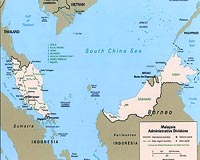 |
Beirut, Lebanon (UPI) Sep 24, 2009 Russia's apparent shift toward supporting U.N.-mandated sanctions on Iran over its disputed nuclear program boosts the prospects of a U.S.-led bid to slash the Islamic republic's economic lifeline - the gasoline and other refined products it is forced to import. But China and Venezuela seem set to defy those sanctions. Oil traders reported that this month China has been supplying 30,000-40,000 barrels a day, about one-third of Iran's gasoline requirements. On Wednesday, The Financial Times quoted traders and bankers familiar with Iran's purchasing practices as saying much of the Chinese gasoline was supplied through intermediaries. About half the current supplies reportedly go through Singapore. Venezuelan President Hugo Chavez announced during a Sept. 5-6 visit to Tehran that Caracas will start exporting 20,000 barrels of oil a day, worth $800 million to $900 million, to Iran starting in October. That would amount to some 20 percent of its total consumption needs at a time when the Islamic Republic is under mounting pressure to abandon work on its alleged nuclear weapons program. Tehran says its nuclear enterprise is for peaceful purposes. Iran is the world's fifth largest oil exporter. But it lacks refining capacity and has to import up to 40 percent of its gasoline requirements. The United States has been seeking to squeeze Iran through economic and financial sanctions for nearly three decades. But it began tightening the noose in 1996 with the Iran-Libya sanctions Act, which imposes penalties on foreign companies investing more than $20 million in Iran's vital but badly rundown energy sector. This process of financial strangulation was extended to Iran's military and banking institutions in 2007, when they banned from the U.S. financial system. On top of all this, there are four sets of U.N. sanctions that target corporations and individuals connected to Tehran's nuclear program. In late 2007, the U.S. Congress branded the Islamic Revolutionary Guards Corps, the Tehran regime's Praetorian Guard and Iran's paramount military force, a foreign terrorist organization. The corps, which is close to hard-line President Mahmoud Ahmadinejad, has in recent years become a major force in the Iranian economy, so targeting such a prolific player and linking it to terrorism has had a significant impact. According to the U.S.-based intelligence consultancy Strategic Forecasting, more than 80 international banks have severed links with Iran since 2008. Several of Iran's major oil suppliers, including BP of Britain and Reliance Industries of India, have not provided any gasoline for several months, traders say. But others continue to do so, they report, and in sufficient volume to keep Iran's floundering economy ticking over. These include Total of France and the Anglo-Dutch Royal Dutch Shell, which traders say have sold cargoes for October delivery. It is not clear if that will continue if sanctions are imposed. But it is China's continuing supplies that will be vital for Iran if the tough new sanctions - U.S. officials say they will be "crippling" - are imposed. Still, there is a widespread belief that Beijing is simply exploiting an opportunity to make hay while the sun shines and that it is simply putting itself in a good bargaining position with the United States if sanction go ahead. "With a number of energy majors dropping out of the gasoline trade to Iran, an enticing market has opened," according to Strategic Forecasting. "But China does not want to face off with the United States because it continues to rely on its markets and consumers. "Moreover, China is a massive energy importer itself, so exporting gasoline to Iran is something that works against its own energy security strategies," the U.S. consultancy noted. "China traditionally has resisted international sanctions against Iran, but if it is going to be forced to collaborate with the United States, it will now have a bargaining chip by way of Iranian gasoline supplies." Russia's move toward the U.S. position on sanctions followed U.S. President Barack Obama's decision to scrap plans to deploy anti-missile interceptors in Poland and the Czech Republic, which Moscow vehemently opposed. It remains to be seen what China's price will be. Share This Article With Planet Earth
Related Links Powering The World in the 21st Century at Energy-Daily.com
 Malaysia's regions want more oil revenues
Malaysia's regions want more oil revenuesWashington (UPI) Sep 23, 2009 Malaysia's Kelantan state government is still pursuing its oil royalty claim with the federal government. Recent media reports said Nik Aziz's state administration is seeking $288.5 million in oil revenue royalties, saying that sum represents 5 percent of the federal government's revenue from petroleum and liquefied natural gas extracted from offshore Kelantan production facilities ... read more |
|
| The content herein, unless otherwise known to be public domain, are Copyright 1995-2009 - SpaceDaily. AFP and UPI Wire Stories are copyright Agence France-Presse and United Press International. ESA Portal Reports are copyright European Space Agency. All NASA sourced material is public domain. Additional copyrights may apply in whole or part to other bona fide parties. Advertising does not imply endorsement,agreement or approval of any opinions, statements or information provided by SpaceDaily on any Web page published or hosted by SpaceDaily. Privacy Statement |